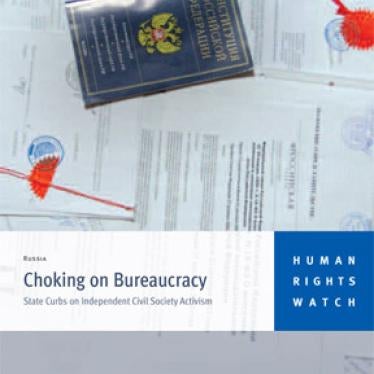(New York) - The criminal sentence imposed on the former Yukos Oil company owner, Mikhail Khodorkovsky, and his business partner, Platon Lebedev, highlights a politically motivated trial and deep-seated problems with Russia's justice system, Human Rights Watch said today.
On December 30, 2010, Moscow's Khamovnichesky district court sentenced Khodorkovsky and Lebedev to 14 years in prison each on theft and embezzlement charges. Both men are currently serving eight-year prison terms after being found guilty of fraud and tax evasion in 2005.
"The sentence is a blow to the rule of law in Russia," said Rachel Denber, acting Europe and Central Asia director at Human Rights Watch. "Everything about the charges and the trial indicates that the case against him is political."
Khodorkovsky and Lebedev were charged with theft and embezzlement of oil produced by Yukos from 1998 to 2003, and their trial began in March 2009. Prosecutors brought the new charges in February 2007 when both men, having served more than half of their earlier sentences, approached eligibility for parole.
The beginning of Khodorkovsky and Lebedev's new term was set at the time of their arrest in 2003, making 2017 the year they will be scheduled for release.
Human Rights Watch has expressed concern about the lack of due process in the court proceedings against Khodorkovsky and Lebedev, and with criminal justice in Russia more generally. For instance, during his annual question-and-answer session with the Russian public on December 1, while the trial was in process, Prime Minister Vladimir Putin referred to Khodorkovsky as a thief and implied that his guilt had already been determined by the court.
Human Rights Watch, together with Human Rights First, Freedom House, International League for Human Rights, and the Jacob Blaustein Institute for Human Rights, sent a joint letter in October to President Dmitri Medvedev expressing concern about the circumstances under which prosecutors brought criminal charges against Khodorkovsky and Lebedev and about the numerous allegations of misconduct by criminal justice officials during both criminal trials.
The letter described flaws in the charges on which the men were tried, allegations that the court tolerated serious procedural errors, and evidence suggesting that government investigators engaged in intimidation, harassment, beating, and denial of necessary medical treatment to witnesses and defense attorneys.
The organizations urged Medvedev to call on prosecutors to drop the charges against both men and to release them from prison. "The timing and circumstances of prosecutors' decision to pursue a second prosecution of Khodorkovsky and Lebedev added credence to claims that the proceedings were motivated by political considerations," the organizations said in the letter.







